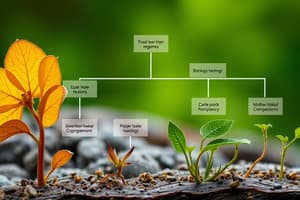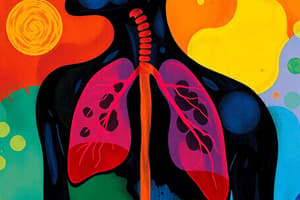Podcast
Questions and Answers
What is the definition of biology?
What is the definition of biology?
The study of living organisms and life's processes.
What is the ultimate unit of life?
What is the ultimate unit of life?
Cell
Which of the following is NOT a characteristic of living things?
Which of the following is NOT a characteristic of living things?
- Maintain homeostasis
- Ability to move (correct)
- Adapt to the environment
- Ability to reproduce
- Made of at least one cell
What are the two main types of cells?
What are the two main types of cells?
Prokaryotes have a membrane-bound nucleus.
Prokaryotes have a membrane-bound nucleus.
Which of the following is NOT a defining feature of humans?
Which of the following is NOT a defining feature of humans?
What is the smallest unit of classification?
What is the smallest unit of classification?
What are the three domains of life?
What are the three domains of life?
What are the four kingdoms within the domain Eukarya?
What are the four kingdoms within the domain Eukarya?
What are the steps of the scientific method?
What are the steps of the scientific method?
What is the difference between an independent and dependent variable?
What is the difference between an independent and dependent variable?
A hypothesis can be proven true.
A hypothesis can be proven true.
What are the criteria for a hypothesis to become a theory?
What are the criteria for a hypothesis to become a theory?
What are some examples of how science has improved technology and the human condition?
What are some examples of how science has improved technology and the human condition?
Science can provide moral or belief answers.
Science can provide moral or belief answers.
Flashcards
What is Biology?
What is Biology?
The study of life and living organisms.
What is Science?
What is Science?
The study of the natural world using evidence and observation.
What is a Prokaryote?
What is a Prokaryote?
A cell without a nucleus or other membrane-bound organelles. DNA floats freely.
What is a Eukaryote?
What is a Eukaryote?
Signup and view all the flashcards
What is a Species?
What is a Species?
Signup and view all the flashcards
Define Hypothesis
Define Hypothesis
Signup and view all the flashcards
What's a controlled Experiment?
What's a controlled Experiment?
Signup and view all the flashcards
What's an independent variable?
What's an independent variable?
Signup and view all the flashcards
What's a dependent variable?
What's a dependent variable?
Signup and view all the flashcards
What is a Theory?
What is a Theory?
Signup and view all the flashcards
What is a Hypothesis?
What is a Hypothesis?
Signup and view all the flashcards
What is Inductive Reasoning?
What is Inductive Reasoning?
Signup and view all the flashcards
What is Deductive Reasoning?
What is Deductive Reasoning?
Signup and view all the flashcards
What is the Purpose of a Hypothesis?
What is the Purpose of a Hypothesis?
Signup and view all the flashcards
What is an Experiment?
What is an Experiment?
Signup and view all the flashcards
What are the steps of the Scientific Method?
What are the steps of the Scientific Method?
Signup and view all the flashcards
What is Homeostasis?
What is Homeostasis?
Signup and view all the flashcards
What is Metabolism?
What is Metabolism?
Signup and view all the flashcards
What is Cellular Respiration?
What is Cellular Respiration?
Signup and view all the flashcards
What is Photosynthesis?
What is Photosynthesis?
Signup and view all the flashcards
What is a Heterotroph?
What is a Heterotroph?
Signup and view all the flashcards
What is an Autotroph?
What is an Autotroph?
Signup and view all the flashcards
What is Anabolism?
What is Anabolism?
Signup and view all the flashcards
What is Catabolism?
What is Catabolism?
Signup and view all the flashcards
What is a Population?
What is a Population?
Signup and view all the flashcards
What is a Community?
What is a Community?
Signup and view all the flashcards
Define Ecosystem
Define Ecosystem
Signup and view all the flashcards
What is the Biosphere?
What is the Biosphere?
Signup and view all the flashcards
What is Evolution?
What is Evolution?
Signup and view all the flashcards
What is Reproduction?
What is Reproduction?
Signup and view all the flashcards
Study Notes
Chapter 1: Human Biology, Science, and Society
- Human biology is the study of the human body, how it works, improving health, relationships with Earth, ecology, evolution, and human impacts on Earth.
- Biology is the study of the natural world and living organisms and life's processes. The word "bio" comes from the Greek word meaning "life," and "logos," meaning "word/thoughts" (or study of).
- Living things are made of at least one cell, composed of proteins, lipids, carbohydrates, and nucleic acids.
Characteristics of Life
- Living things exhibit several characteristics, although these can vary.
Diversity vs. Unit of Life
- A Prokaryote is a cell that does not have a nucleus, and no membrane bound organelles. Bacteria fall into the prokaryote category. DNA floats freely in a prokaryotic cell.
- A Eukaryote is a cell with a nucleus and other organelles enclosed by membranes. Organisms such as plants and animals are eukaryotes.
Classification of Life
- Organisms are categorized into three domains: Bacteria, Archaea, and Eukarya.
- Within Eukarya, organisms are further classified into kingdoms: Protista, Plantae, Fungi, and Animalia.
- The smallest unit of classification is species, followed by genus. Humans belong to the genus Homo and the species sapiens.
Levels of Biological Organization
- Biology can be studied at various levels, ranging from atoms to molecules to cells, tissues, organs, organ systems, organisms, populations, communities, ecosystems, and biosphere.
The Scientific Method
- Science is both a body of knowledge and a process.
- The scientific method is a procedure used to test ideas. Steps include observation, hypothesis, prediction, experiment and results, conclusion.
- A hypothesis is a tentative statement or testable prediction. It can be supported or refuted, but not definitively proven true.
- Predictions are based on the hypothesis and often take the form of an "if...then" statement.
- Controlled experiments involve manipulating one variable while keeping others constant. The independent variable is the one that is manipulated and the dependent variable is the response to the independent variable.
- Scientific findings are disseminated through peer-reviewed journals.
- Well-tested hypotheses form theories. Theories may be refuted in the future.
Critical Thinking in Science
- Critical thinking is vital in evaluating scientific information. It involves skepticism, understanding graphs and statistics, recognizing anecdotes from scientific evidence, separating facts from conclusions, and distinguishing correlation from causation.
Role of Science in Society
- Science improves technology and human conditions (e.g., better crops, cures for diseases, weather predictions).
- Science has limitations. Scientific knowledge only provides physical explanations of the natural world, and cannot provide moral or belief answers.
Studying That Suits You
Use AI to generate personalized quizzes and flashcards to suit your learning preferences.




